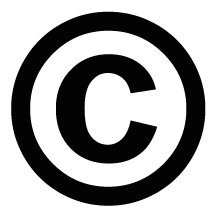 |
| Image Credit: Copyright Authority |
The U.S Copyright Office defines copyright infringement as, “when a copyrighted work is reproduced, distributed, performed, publicly displayed, or made into a derivative work without the permission of the copyright owner.” In laymen’s terms, this means copyright infringement occurs when someone uses another person’s work without permission.
So that image that you just copied and pasted is considered a crime.
Using someone else’s photographs without their consent is considered stealing. Stealing is a crime and punishable by law. If you steal any image on or offline, you are committing a federal crime and are subject to appropriate punishments.
Unfortunately, it is very rare that someone gets arrested/ fined for using someone else’s work. Instead, they get sued, usually by the photographer or large companies.
Large companies are able to defend themselves against copyright infringement. However, small photographers and artists are often unable to afford the legal costs to protect themselves.
Locally; a Lebanon women, Danita Cahill, discovered she was a victim of a copyright Infringement. In February of 2012, the freelance writer and photographer was alerted to the fact that an image she had taken was being used on a decorative tile for sale for $12 at a New Mexico truck stop.
Cahill immediately starting investigating and found that the company selling these tiles, Sun and Fun Specialties, wasn't the company at fault. They told her that Rainbow Trading Company of Dallas, Texas was the manufacturer of the tiles. Rainbow Trading company owner, Paul Kim, said he had bought the image along with about 100 others from a woman who said she paid for the images and got them off a website.
Kim said he would get Danita the woman’s contact information and get back to her. The article, which was originally published in the Albany Democrat-Hearld, was never followed up on.
This situation is a reminder that copyright infringement can happen in your own back yard and how vulnerable your images are to theft when online.
Although I don't have a personal experience with someone stealing my images, I can't imagine it. As a amateur photographer, the thought of someone taking a image you've worked hard on and claiming it as their own is very angering.
People think that if an image doesn't have the little c, ©, somewhere in the image, that they are allowed to use it and mass produce it as they please. Unfortunately, this is not the case.
Some don't know this but the moment the photographer clicks down that shutter button, that image they've taken immediately becomes their property. They own the rights to that image and any use without their express written consent is illegal.
Some images can be used, legally, through Creative Commons. Creative Commons is an organization that allows creators to express if they wish to release their rights to certain images so that others can use them freely or keep them.
Creative Commons licenses do not replace copyright, but are based upon it.
Co-founder of the Creative Commons, Lawrence Lessig said, "Copyright gives people almost to much protection, There is no easy way to signal 'I don't need all this protection, I am happy to give away some rights'. So we created this technology that makes it easy for artists to signal the kind of rights they are happy to give away while signaling rights they want to keep."
"It facilitates sharing, building, and remixing on top of content where the authors opt in to this more balanced and rational copyright system and it supports the idea of remixing with support of the author," said Lessig.
People need to stop illegally stealing images online. So, next time you go to search for an image on a Google for that research paper, please check and make sure it is legal for you to use it. If not, then make sure that you get the photographer’s permission to use that image or at least give them credit for the image.
--At A Glance--
Copyright Infringement
Do: Check that you can use the image and give them credit
Don't: Pass Google Images off as your own
**http://creativecommons.org/tag/lawrence-lessig**


